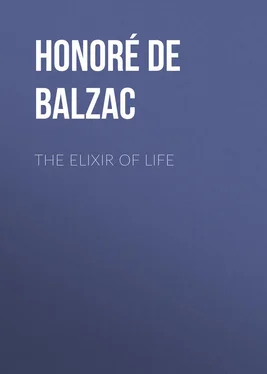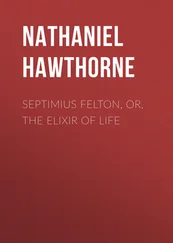Honoré Balzac - The Elixir of Life
Здесь есть возможность читать онлайн «Honoré Balzac - The Elixir of Life» — ознакомительный отрывок электронной книги совершенно бесплатно, а после прочтения отрывка купить полную версию. В некоторых случаях можно слушать аудио, скачать через торрент в формате fb2 и присутствует краткое содержание. Жанр: literature_19, foreign_antique, foreign_prose, на английском языке. Описание произведения, (предисловие) а так же отзывы посетителей доступны на портале библиотеки ЛибКат.
- Название:The Elixir of Life
- Автор:
- Жанр:
- Год:неизвестен
- ISBN:нет данных
- Рейтинг книги:5 / 5. Голосов: 1
-
Избранное:Добавить в избранное
- Отзывы:
-
Ваша оценка:
- 100
- 1
- 2
- 3
- 4
- 5
The Elixir of Life: краткое содержание, описание и аннотация
Предлагаем к чтению аннотацию, описание, краткое содержание или предисловие (зависит от того, что написал сам автор книги «The Elixir of Life»). Если вы не нашли необходимую информацию о книге — напишите в комментариях, мы постараемся отыскать её.
The Elixir of Life — читать онлайн ознакомительный отрывок
Ниже представлен текст книги, разбитый по страницам. Система сохранения места последней прочитанной страницы, позволяет с удобством читать онлайн бесплатно книгу «The Elixir of Life», без необходимости каждый раз заново искать на чём Вы остановились. Поставьте закладку, и сможете в любой момент перейти на страницу, на которой закончили чтение.
Интервал:
Закладка:
Honoré de Balzac
The Elixir of Life
TO THE READER
At the very outset of the writer's literary career, a friend, long since dead, gave him the subject of this Study. Later on he found the same story in a collection published about the beginning of the present century. To the best of his belief, it is some stray fancy of the brain of Hoffmann of Berlin; probably it appeared in some German almanac, and was omitted in the published editions of his collected works. The Comedie Humaine is sufficiently rich in original creations for the author to own to this innocent piece of plagiarism; when, like the worthy La Fontaine, he has told unwittingly, and after his own fashion, a tale already related by another. This is not one of the hoaxes in vogue in the year 1830, when every author wrote his "tale of horror" for the amusement of young ladies. When you have read the account of Don Juan's decorous parricide, try to picture to yourself the part which would be played under very similar circumstances by honest folk who, in this nineteenth century, will take a man's money and undertake to pay him a life annuity on the faith of a chill, or let a house to an ancient lady for the term of her natural life! Would they be for resuscitating their clients? I should dearly like a connoisseur in consciences to consider how far there is a resemblance between a Don Juan and fathers who marry their children to great expectations. Does humanity, which, according to certain philosophers, is making progress, look on the art of waiting for dead men's shoes as a step in the right direction? To this art we owe several honorable professions, which open up ways of living on death. There are people who rely entirely on an expected demise; who brood over it, crouching each morning upon a corpse, that serves again for their pillow at night. To this class belong bishops' coadjutors, cardinals' supernumeraries, tontiniers , and the like. Add to the list many delicately scrupulous persons eager to buy landed property beyond their means, who calculate with dry logic and in cold blood the probable duration of the life of a father or of a step-mother, some old man or woman of eighty or ninety, saying to themselves, "I shall be sure to come in for it in three years' time, and then – " A murderer is less loathsome to us than a spy. The murderer may have acted on a sudden mad impulse; he may be penitent and amend; but a spy is always a spy, night and day, in bed, at table, as he walks abroad; his vileness pervades every moment of his life. Then what must it be to live when every moment of your life is tainted with murder? And have we not just admitted that a host of human creatures in our midst are led by our laws, customs, and usages to dwell without ceasing on a fellow-creature's death? There are men who put the weight of a coffin into their deliberations as they bargain for Cashmere shawls for their wives, as they go up the staircase of a theatre, or think of going to the Bouffons, or of setting up a carriage; who are murderers in thought when dear ones, with the irresistible charm of innocence, hold up childish foreheads to be kissed with a "Good-night, father!" Hourly they meet the gaze of eyes that they would fain close for ever, eyes that still open each morning to the light, like Belvidero's in this Study. God alone knows the number of those who are parricides in thought. Picture to yourself the state of mind of a man who must pay a life annuity to some old woman whom he scarcely knows; both live in the country with a brook between them, both sides are free to hate cordially, without offending against the social conventions that require two brothers to wear a mask if the older will succeed to the entail, and the other to the fortune of a younger son. The whole civilization of Europe turns upon the principle of hereditary succession as upon a pivot; it would be madness to subvert the principle; but could we not, in an age that prides itself upon its mechanical inventions, perfect this essential portion of the social machinery?
If the author has preserved the old-fashioned style of address To the Reader before a work wherein he endeavors to represent all literary forms, it is for the purpose of making a remark that applies to several of the Studies, and very specially to this. Every one of his compositions has been based upon ideas more or less novel, which, as it seemed to him, needed literary expression; he can claim priority for certain forms and for certain ideas which have since passed into the domain of literature, and have there, in some instances, become common property; so that the date of the first publication of each Study cannot be a matter of indifference to those of his readers who would fain do him justice.
Reading brings us unknown friends, and what friend is like a reader? We have friends in our own circle who read nothing of ours. The author hopes to pay his debt, by dedicating this work Diis ignotis .
THE ELIXIR OF LIFE
One winter evening, in a princely palace at Ferrara, Don Juan Belvidero was giving a banquet to a prince of the house of Este. A banquet in those times was a marvelous spectacle which only royal wealth or the power of a mightly [sic] lord could furnish forth. Seated about a table lit up with perfumed tapers, seven laughter-loving women were interchanging sweet talk. The white marble of the noble works of art about them stood out against the red stucco walls, and made strong contrasts with the rich Turkey carpets. Clad in satin, glittering with gold, and covered with gems less brilliant than their eyes, each told a tale of energetic passions as diverse as their styles of beauty. They differed neither in their ideas nor in their language; but the expression of their eyes, their glances, occasional gestures, or the tones of their voices supplied a commentary, dissolute, wanton, melancholy, or satirical, to their words.
One seemed to be saying – "The frozen heart of age might kindle at my beauty."
Another – "I love to lounge upon cushions, and think with rapture of my adorers."
A third, a neophyte at these banquets, was inclined to blush. "I feel remorse in the depths of my heart! I am a Catholic, and afraid of hell. But I love you, I love you so that I can sacrifice my hereafter to you."
The fourth drained a cup of Chian wine. "Give me a joyous life!" she cried; "I begin life afresh each day with the dawn. Forgetful of the past, with the intoxication of yesterday's rapture still upon me, I drink deep of life – a whole lifetime of pleasure and of love!"
The woman who sat next to Juan Belvidero looked at him with a feverish glitter in her eyes. She was silent. Then – "I should need no hired bravo to kill my lover if he forsook me!" she cried at last, and laughed, but the marvelously wrought gold comfit box in her fingers was crushed by her convulsive clutch.
"When are you to be Grand Duke?" asked the sixth. There was the frenzy of a Bacchante in her eyes, and her teeth gleamed between the lips parted with a smile of cruel glee.
"Yes, when is that father of yours going to die?" asked the seventh, throwing her bouquet at Don Juan with bewitching playfulness. It was a childish girl who spoke, and the speaker was wont to make sport of sacred things.
"Oh! don't talk about it," cried Don Juan, the young and handsome giver of the banquet. "There is but one eternal father, and, as ill luck will have it, he is mine."
The seven Ferrarese, Don Juan's friends, the Prince himself, gave a cry of horror. Two hundred years later, in the days of Louis XV., people of taste would have laughed at this witticism. Or was it, perhaps, that at the outset of an orgy there is a certain unwonted lucidity of mind? Despite the taper light, the clamor of the senses, the gleam of gold and silver, the fumes of wine, and the exquisite beauty of the women, there may perhaps have been in the depths of the revelers' hearts some struggling glimmer of reverence for things divine and human, until it was drowned in glowing floods of wine! Yet even then the flowers had been crushed, eyes were growing dull, and drunkenness, in Rabelais' phrase, had "taken possession of them down to their sandals."
Читать дальшеИнтервал:
Закладка:
Похожие книги на «The Elixir of Life»
Представляем Вашему вниманию похожие книги на «The Elixir of Life» списком для выбора. Мы отобрали схожую по названию и смыслу литературу в надежде предоставить читателям больше вариантов отыскать новые, интересные, ещё непрочитанные произведения.
Обсуждение, отзывы о книге «The Elixir of Life» и просто собственные мнения читателей. Оставьте ваши комментарии, напишите, что Вы думаете о произведении, его смысле или главных героях. Укажите что конкретно понравилось, а что нет, и почему Вы так считаете.












